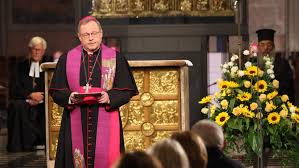As Germany gears up for a critical vote on who will sit on the country’s constitutional court, a fierce debate has erupted—not just about legal qualifications, but about the very core of human rights.
In the middle of it all, two influential Bavarian bishops are speaking out, warning against any erosion of human dignity.
Bishops Urge Lawmakers to Draw a Clear Line
Bishop Stefan Oster of Passau and Bishop Rudolf Voderholzer of Regensburg have publicly urged lawmakers to prioritize the sanctity of human life in their decision-making.
Without directly naming names, the bishops made it clear that anyone who downplays the value of every human being—from conception to natural death—should not be trusted with a role on Germany’s top court.
“There must never again be second-class people,” they declared, sending a pointed reminder of the lessons Germany has learned from its own dark history.
Spotlight Falls on Abortion Debate and Court Nominee
At the heart of this controversy is law professor Frauke Brosius-Gersdorf, the nominee put forward by the Social Democratic Party (SPD).
Her past involvement in abortion law reform and comments about when human dignity protections should begin have drawn major criticism.
She previously stated that it is constitutionally valid to legalize abortion during the first 12 weeks of pregnancy—and went even further by suggesting that human dignity, as protected by Germany’s Basic Law, might only apply from birth.
Bishops Push Back on Controversial Legal Views
Though the bishops didn’t mention Brosius-Gersdorf by name, their remarks were clearly aimed at the kind of constitutional interpretation she has been associated with.
They emphasized that any attempt to relativize the protection of human dignity goes against the foundational principles of the German constitution and should be disqualifying for anyone seeking a seat on the court.
Christian Democrats Add to the Criticism
The two bishops aren’t the only ones speaking out.
Some members of the Christian Democratic Union (CDU) have taken to social media to slam the nomination.
One term that’s been thrown around quite a bit? “Unelectable.”
The CDU’s pushback has added further weight to the growing unease about Friday’s vote, which will decide whether Brosius-Gersdorf—and two other nominees—will secure a place on Germany’s constitutional court.
What’s Really at Stake
This is more than just a legal debate—it’s a moral crossroads for Germany.
The constitutional court plays a key role in safeguarding the country’s core values, including its commitment to protect the most vulnerable.
For many religious leaders and conservative lawmakers, the idea of appointing someone who questions when human dignity begins raises red flags that go far beyond partisan politics.
Looking Ahead to a Divisive Vote
The German parliament is set to vote on Friday, and tensions are running high.
It’s a pivotal moment that could not only shape the future of the court, but also reflect the direction Germany is heading in its approach to human rights, law, and the value of life.



